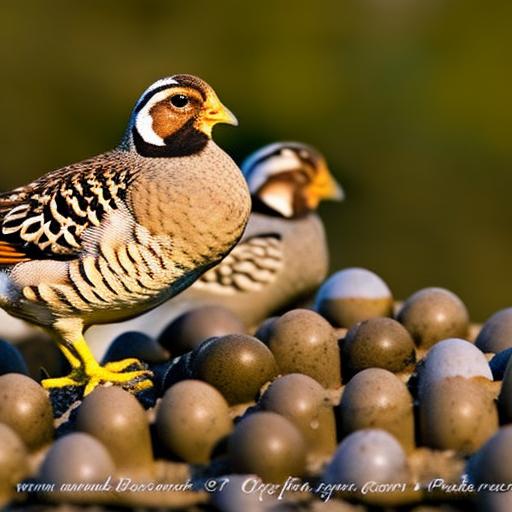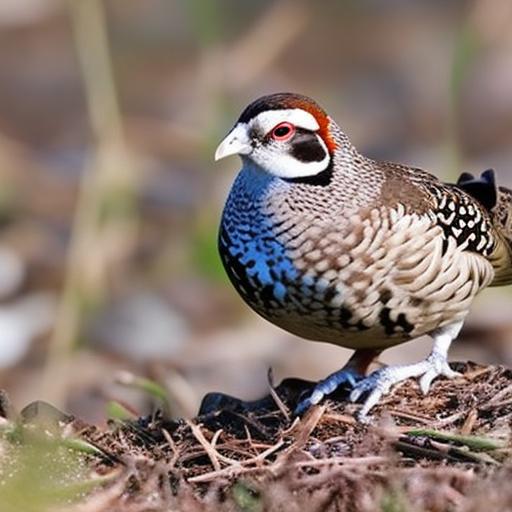Selecting the right breeding stock is crucial for a successful quail breeding operation. When choosing breeding stock, it’s important to look for birds that are healthy, active, and free from any genetic defects. Look for birds that are of good size and weight, as this is an indication of their overall health and vitality. It’s also important to select birds that have a good temperament, as aggressive or overly skittish birds may not be ideal for breeding.
When selecting breeding stock, it’s also important to consider the genetic diversity of the birds. Inbreeding can lead to a host of genetic problems, so it’s important to choose birds from different bloodlines to ensure genetic diversity. This will help to produce healthier and more robust offspring. Additionally, it’s important to choose birds that have a proven track record of good egg production and fertility. Look for birds that come from a line of good layers and have a history of successful breeding.
In summary, when selecting breeding stock, look for healthy, active birds that are free from genetic defects. Choose birds that are of good size and weight, have a good temperament, and come from diverse genetic backgrounds. Selecting the right breeding stock is the first step in building a successful quail breeding operation.
Table of Contents
- 1 Housing and Care for Breeding Quail
- 2 Breeding Quail Nutrition and Feeding
- 3 Incubation and Hatching of Quail Eggs
- 4 Caring for Quail Chicks
- 5 Marketing and Selling Quail
- 6 Legal Considerations for Breeding Quail
- 7 FAQs
- 7.1 What is quail breeding for sale?
- 7.2 What are the benefits of breeding quail for sale?
- 7.3 What are the basic requirements for breeding quail for sale?
- 7.4 What are some common challenges in breeding quail for sale?
- 7.5 What are the legal considerations for breeding quail for sale?
- 7.6 What are some common breeds of quail used for breeding for sale?
Key Takeaways
- Select breeding stock with good genetics and health to ensure strong and productive offspring
- Provide spacious and clean housing for breeding quail to minimize stress and maximize breeding success
- Offer a balanced diet with high protein content to breeding quail for optimal egg production and fertility
- Maintain proper temperature and humidity levels during incubation to ensure successful hatching of quail eggs
- Provide warmth, proper nutrition, and protection from predators for quail chicks to ensure their survival and growth
- Understand and comply with local regulations and laws regarding the breeding and selling of quail
Housing and Care for Breeding Quail
Proper housing and care are essential for the health and well-being of breeding quail. When it comes to housing, it’s important to provide enough space for the birds to move around comfortably. Overcrowding can lead to stress and aggression among the birds, which can negatively impact breeding success. A good rule of thumb is to provide at least 1 square foot of space per bird in the coop or cage.
In addition to space, it’s important to provide a clean and well-ventilated environment for the quail. Regular cleaning of the coop or cage is essential to prevent the buildup of waste and bacteria. Good ventilation is also important for maintaining air quality and preventing respiratory issues.
When it comes to care, it’s important to provide a balanced diet for the quail that includes a high-quality commercial feed as well as access to fresh water at all times. It’s also important to monitor the birds for any signs of illness or injury and provide prompt veterinary care when needed.
In summary, proper housing and care are essential for the health and well-being of breeding quail. Provide enough space, clean and well-ventilated housing, and a balanced diet to ensure the health and vitality of the birds.
Breeding Quail Nutrition and Feeding
Proper nutrition is essential for the health and reproductive success of breeding quail. A high-quality commercial feed formulated specifically for quail is the foundation of a good diet. Look for a feed that contains a balance of protein, vitamins, and minerals to support the health and vitality of the birds.
In addition to commercial feed, it’s important to provide access to fresh water at all times. Quail are small birds with high metabolisms, so they require a constant supply of water to stay healthy and hydrated. It’s also important to provide access to grit or small stones, which the quail use to help grind their food in their gizzards.
In addition to commercial feed and water, it’s also beneficial to supplement the quail’s diet with fresh greens and insects. This can help provide additional nutrients and variety to their diet, which can support overall health and reproductive success.
In summary, proper nutrition is essential for the health and reproductive success of breeding quail. Provide a high-quality commercial feed, access to fresh water, and supplement their diet with fresh greens and insects to support their overall health and vitality.
Incubation and Hatching of Quail Eggs
Incubating and hatching quail eggs is an exciting part of the breeding process. Proper incubation is essential for the development of healthy chicks. The first step is to collect fresh eggs from the breeding stock and store them in a cool, dry place until you are ready to set them in the incubator.
When it comes to incubation, it’s important to maintain consistent temperature and humidity levels throughout the process. The ideal temperature for incubating quail eggs is around 99.5 degrees Fahrenheit, with a humidity level of around 60%. It’s important to invest in a reliable incubator that can maintain these conditions consistently.
Quail eggs typically take around 17-18 days to hatch, so it’s important to monitor the eggs closely throughout the process. Keep an eye on the temperature and humidity levels, and turn the eggs regularly to ensure even development.
Once the eggs begin to hatch, it’s important to provide a warm and safe environment for the chicks to dry off and fluff up before moving them to a brooder. Proper incubation is essential for the successful hatching of quail eggs, so it’s important to invest in a reliable incubator and monitor the process closely.
Caring for Quail Chicks
Caring for quail chicks is an important part of the breeding process. Once the chicks have hatched, it’s important to move them to a brooder that provides a warm and safe environment for them to grow and develop. A brooder should be equipped with a heat lamp to maintain a temperature of around 95 degrees Fahrenheit for the first week, gradually decreasing by 5 degrees each week until they are fully feathered.
In addition to warmth, it’s important to provide access to fresh water and a high-quality chick starter feed formulated specifically for quail. It’s also important to monitor the chicks closely for any signs of illness or injury and provide prompt veterinary care when needed.
As the chicks grow, it’s important to gradually introduce them to their eventual outdoor environment. This can help them acclimate to changes in temperature and weather conditions, which can support their overall health and vitality.
In summary, caring for quail chicks involves providing a warm and safe environment, access to fresh water and high-quality feed, and monitoring their health closely as they grow and develop.
Marketing and Selling Quail

Marketing and selling quail can be an exciting part of running a quail breeding operation. There are several avenues for selling quail, including direct sales to consumers, selling to restaurants or specialty food markets, or supplying other breeders with breeding stock.
When marketing quail directly to consumers, it’s important to highlight the quality and freshness of the product. Consider offering different cuts of meat or value-added products like quail eggs or marinated quail meat to appeal to a wider range of customers.
Selling quail to restaurants or specialty food markets can be a lucrative option, as there is often high demand for specialty meats like quail in these markets. Consider reaching out to local chefs or specialty food retailers to gauge interest in your product.
Supplying other breeders with breeding stock can also be a profitable avenue for selling quail. Look for breeders who are looking to diversify their bloodlines or improve their breeding stock, and consider offering discounts for bulk purchases.
In summary, marketing and selling quail can be an exciting part of running a quail breeding operation. Consider direct sales to consumers, selling to restaurants or specialty food markets, or supplying other breeders with breeding stock as potential avenues for selling quail.
Legal Considerations for Breeding Quail
When breeding quail, it’s important to be aware of any legal considerations that may apply to your operation. Depending on your location, there may be regulations or permits required for breeding quail for commercial purposes.
It’s important to research any local or state regulations that may apply to your quail breeding operation. This may include zoning regulations related to keeping livestock or regulations related to food safety and processing if you plan on selling quail meat or eggs.
In addition to local regulations, it’s also important to be aware of any federal regulations that may apply to your operation. This may include regulations related to animal welfare or food safety standards if you plan on selling quail products across state lines.
In summary, when breeding quail for commercial purposes, it’s important to be aware of any legal considerations that may apply to your operation. Research local and state regulations related to keeping livestock and food safety standards, as well as any federal regulations that may apply if you plan on selling quail products across state lines.
If you’re considering breeding quail for sale, it’s essential to provide them with a suitable environment. A well-designed chicken coop can also be adapted for quail housing. Poultry Wizard offers valuable insights into creating an ideal living space for your quail in their article “Chicken Coop Chester SC.” Understanding the dietary needs of quails is equally important, and their article “What Vegetables Do Quails Eat?” provides helpful information on this topic. Additionally, if you’re considering keeping guinea fowl alongside your quail or chickens, their article “Can Guinea Fowl Live with Chickens?” offers valuable insights into compatibility and cohabitation.
FAQs
What is quail breeding for sale?
Quail breeding for sale refers to the practice of raising quail with the intention of selling them for various purposes, such as meat, eggs, or as pets.
What are the benefits of breeding quail for sale?
Breeding quail for sale can be a profitable venture, as quail are in demand for their meat and eggs. Additionally, quail are relatively easy to care for and require minimal space, making them a convenient option for small-scale farming.
What are the basic requirements for breeding quail for sale?
To breed quail for sale, you will need suitable housing, such as cages or aviaries, as well as proper feeding and watering systems. You will also need to ensure that the quail have access to suitable nesting areas for egg production.
What are some common challenges in breeding quail for sale?
Common challenges in breeding quail for sale include maintaining proper temperature and humidity levels, preventing disease outbreaks, and managing the breeding and hatching process effectively.
What are the legal considerations for breeding quail for sale?
Before starting a quail breeding operation for sale, it is important to research and comply with any local or national regulations regarding the breeding, sale, and transportation of quail. This may include obtaining permits or licenses.
What are some common breeds of quail used for breeding for sale?
Some common breeds of quail used for breeding for sale include Coturnix quail, Bobwhite quail, and California quail. Each breed has its own unique characteristics and suitability for different purposes.
Meet Walter, the feathered-friend fanatic of Florida! Nestled in the sunshine state, Walter struts through life with his feathered companions, clucking his way to happiness. With a coop that’s fancier than a five-star hotel, he’s the Don Juan of the chicken world. When he’s not teaching his hens to do the cha-cha, you’ll find him in a heated debate with his prized rooster, Sir Clucks-a-Lot. Walter’s poultry passion is no yolk; he’s the sunny-side-up guy you never knew you needed in your flock of friends!







